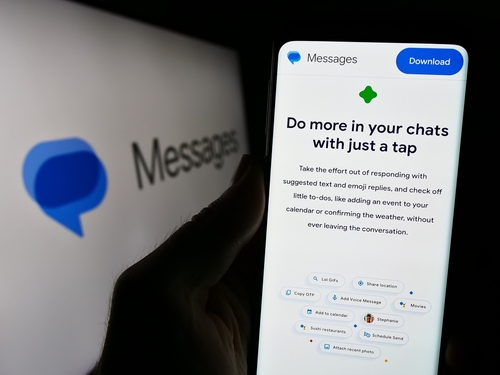

Apple adoption of RCS (Rich Communications Services), will transform the way people and businesses communicate writes Robert Gerstmann, co-founder, of messaging and voice services company Sinch.
Apple’s adoption of RCS is undoubtedly a significant milestone for digital communication. With interactive and secure messaging, RCS enhances customer experience and trust. Brands will be able to engage more effectively with rich content and real-time interactions on a more trustworthy channel.
As Apple integrates RCS, businesses have a prime opportunity to connect with a global audience, driving stronger customer relationships and higher engagement.
Google has backed RCS for a number of years, and Apple’s support with iOS 18 is a game changer for the digital communication market. Apple’s 1.4 billion users will become part of the RCS ecosystem, joining 1.5 billion RCS-enabled Android users. This is an exciting opportunity for brands that want to reach valuable customers across the globe, especially in affluent markets where Apple is widely used.
Interactive experience
RCS shifts the traditional boundaries of messaging by immersing users in a new level of interactive experience. SMS was created for basic text notifications. Although very successful, it has limitations for modern marketing needs. MMS introduced multimedia capabilities but didn’t achieve widespread adoption. RCS has been developed to offer a more feature-rich and interactive communication platform that meets contemporary business and user expectations.
SMS is limited to 160 characters and lacks the ability to include rich content or track message reads. RCS, however, supports video and images, read receipts, real-time reply indicators, branding, and verified senders. It also enables the inclusion of interactive elements like call-to-actions and carousels, providing a more engaging messaging experience.


RCS has only been available on Android handsets, meaning it could never reach global ubiquity. Apple’s upcoming adoption will eventually lead to RCS being supported on every handset globally, making the technology available via the native messaging app on both iOS and Android. Users will not need to download a specific app; it will be available by default as soon as the mobile operator activates it in their network.
This is good news for brands that prioritise user experience for these billions of customers. Data suggests there is a 74 percent higher engagement with brands through RCS compared to SMS, the biggest business messaging channel currently.
Any SMS opt-ins a brand has will be valid for RCS as well, so businesses will not need to get users to opt-in again. Apple has not explicitly announced adoption of RCS business messaging (as opposed to RCS for consumer-to-consumer communication), but it is available in the iOS 18 beta version and should happen. Brands should be ready to use this opportunity for their benefit.

Apple’s adoption of RCS has consumer benefits regardless of which device is used. RCS enables a richer user experience, preventing group chats from breaking between iPhone and Android users and enabling the sending of high-quality images.
Business benefits include read receipts, which are useful for brands to know which messages have been read. By being conversational by nature, RCS enables easy, two-way conversations between brands and consumers, opening up new interactive use cases.
So, how exactly does RCS boost customer experience? A shopper looking for a new outfit online. Instead of receiving a one-way message reminding them about the blouse left in their cart. Online buyers could benefit from a carousel illustrating how that blouse pairs perfectly with the jeans they previously purchased.
This level of personalization and immediacy builds customer loyalty, as shoppers feel more valued by the brand. Over time, these interactions contribute to a stronger brand reputation and open up new growth opportunities for retailers.
Recent data underscores the effectiveness of conversational messaging, revealing that 71% of UK buyers welcome the option to message retailers about their orders. By adopting RCS, retailers can meet these expectations, providing instant responses that foster trust and drive purchase decisions. In the competitive retail sector, leveraging RCS to facilitate immediate and meaningful conversations can be a game-changer, setting brands apart and propelling them towards sustained success.
In the case of Sinch customer French gourmet frozen food brand Picard, RCS highlighted a significant boost in customer engagement. Adopting RCS, resulting in a 42 per cent increase in customer engagement attributed to the rich, interactive features of RCS that allowed Picard to offer a more immersive and responsive customer experience.
With real-time interactions and multimedia capabilities, customers found the messaging experience more engaging and informative, contributing to higher satisfaction and brand loyalty.
Enhanced Security
Adopting RCS is also crucial for ensuring consumers that messages come from the brand they seem to be coming from, thereby reducing the scope of phishing and spam. Brands using verified RCS messaging gain a competitive edge, as 77% of users prefer verified messaging over regular SMS, and 71% feel more confident about businesses using it.
The mobile operators’ robust RCS sender verification processes make it ideal for businesses aiming to enhance customer relationships. With RCS, businesses can align with the evolving landscape of rich messaging while establishing the trustworthiness of their brand. By leveraging RCS, they can not only improve communication but also build customer confidence and loyalty through verified, secure interactions.









